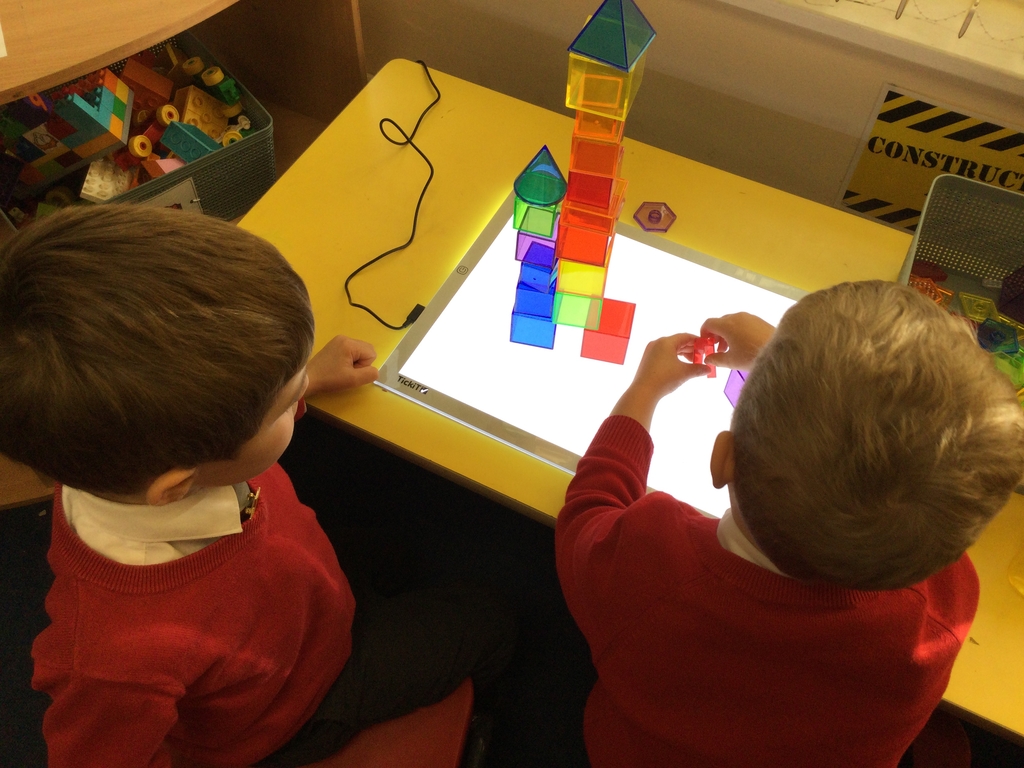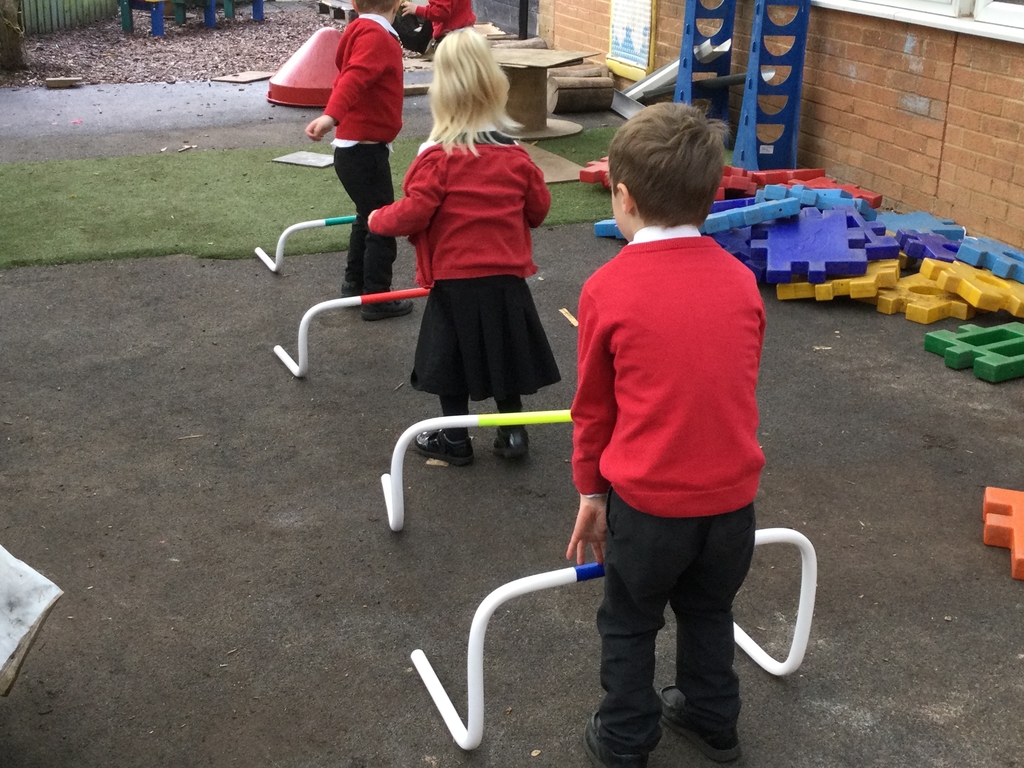POPPIES – Early Years Foundation Stage (EYFS) – Nursery and Reception children
In our Early Years, we have a mixed class of up to 8 Nursery children and 15 Reception children. Our provision for Early Years is committed to offering an excellent education where children flourish. The curriculum lies at the very heart of our Early Years Foundation Stage and it is here where the building blocks to our progressive curriculum are secured and built upon as the children move through our school. We ensure there is an effective balance of adult-led and child-led activities and we have a strong focus on a play based curriculum and a child-led curriculum which caters for individual children’s interests. In child-initiated activities, children show high levels of engagement and this is where skilled practitioners develop the continuous provision to support progress for all of our children. We ensure that our observations and assessments inform our provision and we inspire meaningful learning experiences for every child based on their own fascinations and needs. The characteristics of effective learning underpin all we do in Early Years and the environment, both indoors and out, supports high quality learning experiences. We prioritise and regard the mastering of foundational knowledge as crucial in the younger years. Reading and vocabulary development is therefore an integral part of our curriculum. . We plan our provision from the three Prime Areas and the four Specific Areas of the Early Years Foundation Stage. We work closely with parents and carers, valuing them as true partners in learning.
Personal, Social and Emotional Development
Within this area of learning, children develop their relationships, their self-confidence and behaviours. At Staverton we encourage children to build positive relationships. Adults model being considerate and responsive in all interactions to support children to develop these life-long skills. Children at Staverton are actively encouraged to try new activities and test out ideas and resources both independently and with adult support. We encourage children to live our whole school Values of Friendship, Compassion, Perseverance, Honesty, Respect and Responsibility when they start school at Staverton.
Communication and Language
We ensure children are exposed to a range of high quality books, rhymes and songs to develop their listening and attention skills. All children’s responses are valued and praised, and thinking is developed through skilful questioning by the adults in the settings. Our staff are wonderful at modelling how to ‘be a thinker’ which encourages the children to discuss their ideas and thoughts in the same way. Children’s understanding is developed through planned activities based on their interests and passions. Our provision includes small world play, role play, high quality books, opportunities for children to record their ideas and use story language to develop a narrative.
Physical Development
The children are encouraged to create their own balancing courses and routes in their independent play, using a range of equipment such as crates, wooden planks and balance stones. We have a range of techniques and resources which develop fine and gross motor skills.
English
The children engage in as many opportunities as possible to share high quality texts, songs and rhymes with adults, peers and independently. ‘Snack time’ provides children with wonderful opportunities to talk about healthy eating and extends their opportunities to speak in sentences. The children develop responsibilities for looking after their classroom and the resources.
Children are encouraged to use mark making materials during their play, both large and small scale and refine these skills to become independent writers. We have a range of techniques and resources which develop fine and gross motor skills ready for pencil control and writing.
Mathematics
Our children are encouraged from an early age to play with number through the use of songs and rhymes. Within the Early Years, we ensure our children are provided with opportunities to practice their number skills independently by solving practical problems, such as sharing the play food in the restaurant between the customers and paying for goods in the shop. We link mathematics to the children’s interests, for example being robots and building helmets from the large construction then giving instructions to get somewhere using positional language.
Understanding the World
Our children come from different backgrounds and we celebrate each and every one. We encourage parents and carers to come and speak to the children about their religions and beliefs and share stories of festivals and events they have within different cultures. Our children benefit from a wide exposure to other cultures around the world through our diversity assemblies every Tuesday.
Expressive Arts and Design
There is a wide range of creative materials which children can access independently during their play. Our children love to use construction and open-ended resources to make and build models. We ensure we provide a range of tools for them to explore both indoor and outdoor.
Early Learning Goals
In Poppies we plan our provision areas and activities based on the EYFS Framework. Throughout the EYFS, your child will immerse themselves in play that is specifically designed for them to learn and practise new skills. The skills and knowledge they will gain will help them to achieve the Early Learning Goals by the end of the Reception year and prepare them for the transition to Year 1.
An Enabling Environment
We have a workshop style environment indoors and outside. Nothing is set out on the tables. The children select what they want to do in each area. The principal is that resources are accessible to the children and they are varied, open-ended and high quality. This gives children the opportunity to select resources to support their chosen activity.
The Role of The Adult
The adults are skilled in facilitating learning. They do this through observations, interactions and questioning. Our adults know the children very well and have a sound understanding of child development. This ensures that adults in our setting enhance and extend learning. Interactions with children during planned and child-initiated play include communicating and modelling language, showing, explaining, demonstrating, exploring ideas, encouraging, questioning, recalling, providing a narrative for what they are doing, facilitating and setting challenges.
Adults also look at the way children are learning. These are called the Characteristics of Learning:
Playing and Exploring – do they investigate and experience things, and ‘have a go’?
Learning Actively – do they concentrate and keep on trying if they encounter difficulties, and enjoy achievements?
Creating and Thinking Critically – do they have and develop their own ideas, make links between ideas, and develop strategies for doing things?
Finally, we also consider how content and happy the children are using the Leuven scales of wellbeing and involvement.
Phonics
In Poppies we use Read, Write inc. to support the teaching of early reading and writing skills.
In Term 1 we teach Phase 1 of the Letters and Sounds programme, focusing on developing pre-reading and writing skills through activities such as listening walks, playing musical instruments, body percussion, musical statues, and games such as "What's that noise?" or "I spy", all of which help children to "tune in" to sounds and develop their "listening ears!" We also enjoy lots of opportunities for mark making!
Later in Term 1 and into Term 2 we begin Phase 2 of Letters and Sounds, where we start to teach the children the sounds (phonemes) that are represented by letters (graphemes). We learn 4 new phonemes a week and the children are also taught “Red” words (words that cannot be sounded out). The phonemes and superpower words are taught in a set pattern and every day the children have the opportunity to rehearse the phonemes they have already been taught.
Phonics is taught daily to the Reception children. It is a fun and interactive session that lasts no longer than 20 minutes. The Nursery children will work with an adult to develop pre-reading skills; sharing stories, singing rhymes and playing games. In the summer term we begin introducing the children in Nursery to phonics, laying the foundations for their transition to a more formal phonic input when they transition into Reception.
Maths
In Reception the majority of maths teaching occurs as the children are engaged in their play. They are encouraged to apply and extend their mathematical understanding through their own enquiries as they explore the learning environments. We do however have a daily maths carpet session, where mathematical concepts are introduced and activities demonstrated. At Staverton we follow the White Rose Maths Mastery programme.
Trekking Tuesday
Every Tuesday we spend the afternoon outdoors for Trekking Tuesday. Outdoor learning plays a crucial role in helping children to make sense of the world around them and encourages exploration, curiosity, appreciation and respect for nature and the creatures that live in it. Outdoor learning is imperative to children’s developing understanding of the world and provides opportunities for children to physically explore the world around them and make sense of their physical world, their community and the environment.


